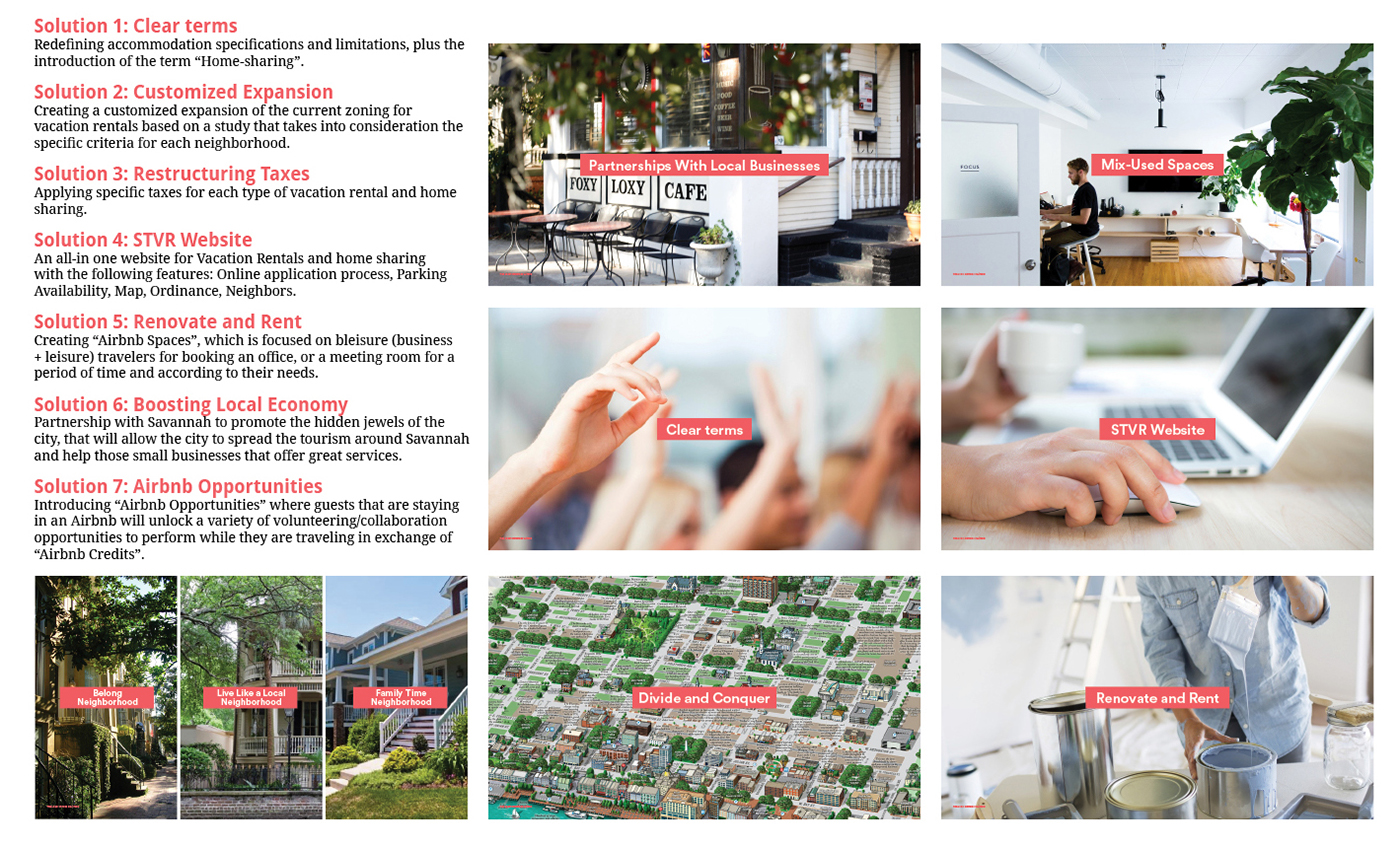Studying The Local Culture of Airbnb in Savannah
A Suite of Solutions That Provides Better Airbnb Experience For Stakeholders in Savannah.

Client
Airbnb Savannah. Airbnb, a trusted community marketplace for people to list, discover and book unique accommodations around the world. Savannah, a coastal city in Georgia, USA.
The Challenge
The challenge of this project is to conduct an ethnographic research of the local culture of Airbnb in Savannah and find problems to address.
The Team
We were a team of 6 of multidisciplinary designers. I helped to conduct secondary research, interviews, observations, data analysis, synthesis, brainstorming and concept development. I also took part in presenting to the stakeholders.
Project duration
The project spanned over 10 weeks during fall 2016. We held a final presentation and hosted a discussion among stakeholders of Airbnb in Savannah.





Cultural probes to gather data about Airbnb in Savannah.
THE PROCESS
The process consisted of ethnographic research methods and analysis that translated later into findings and solutions. Secondary research data was collected and organized through a series of activities: Trends Matrix, Innovation Sourcebook, Competitors-Complementors Map, SWOT analysis, Convergence Map, Intent Statement, Buzz Report. We interviewed 21 people from our stakeholders: Airbnb hosts, Airbnb guests, competitors including bed & breakfasts, Inns, hotels and hostels, neighbors including two neighborhood associations, city departments including tourism and zoning department. Then we analyzed the data and created a stakeholders’ map and a value flow map to understand the value flow between different stakeholders. We used this tool to visualize the relationships and to identify opportunities for new connections. We also created three cultural probes to understand the preferences, aspirations, fears, and concerns of individuals when it comes to shared accommodation. After five weeks of research, we gathered more than 900 data points that we transcribed on yellow post-it notes. We then affinitized the set of data and came up with insights that we later used to find solutions that are of benefit for all Airbnb stakeholders in Savannah.


Findings
We found that there is a misalignment between the interests of Airbnb stakeholders in Savannah: Hotels, Airbnb’s main competitor, fights against expanding the allowed zoning areas where people can use their homes for Airbnb; residents in the city demand the right to host in locations outside of downtown; the tourism department wants to keep Airbnb in touristic and attractive areas where tourist can explore the good parts of the city; the neighborhood association is fighting to diminish the allowed Airbnb rentals to keep a strong community of locals and safer neighborhood; guests or tourists of the city need more rentals and better pricing; local businesses benefit from Airbnb customers and the profits they bring. While studying the stakeholders we knew that we cannot miss any single one. Our solution should be tailored to find a common ground between all of them in order for it to be effective.
Other interesting findings were that some hosts started buying new properties to invest, specifically in Airbnb; A host had a house in Savannah and he saw the opportunity so he bought ten more houses. But that’s not the most interesting thing, hosts are buying houses in poor neighborhoods, since it’s cheaper, and they are renovating these houses, giving the neighborhoods a chance to flourish and become safer, that is even making the neighbors happier. One drawback in Savannah is the lack of community for hosts and the lack of an ambassador. We also noticed that the accommodation industry is starting to take advantage of the Airbnb platform to get more publicity, for example, one BnB that we interviewed in Savannah posted some of its rooms on Airbnb. Another observation is that hotels recommend hundreds of their guests to certain businesses where they can get discounts. And we cannot compare that number with the few Airbnb hosts sending their guests to those places. Unless a community of Airbnb is formed and partnerships are established. In regards to taxes, it is going to the maintenance of touristic areas, so Airbnb users are paying taxes but they are not benefiting from it. Only hotels are. When it comes to regulations and especially zoning, the rules are not clear, especially to the hosts of Savannah.


OUTCOME
We narrowed down our 210 concepts to 12 and then to 7 final solutions that we presented to our stakeholders. We evaluated all solutions based on what best reflects our research and what aligns with all our stakeholders.

Suite of solutions.
Impact
We were able to reunite all the stakeholders in one room to discuss our solutions and receive feedback. The event took place in an Airbnb listing that was built in 1822 and bought in 2015 by the actual owners that revitalized the house and transformed it into a vacation rental. The list of attendees consisted of city officials, Airbnb hosts in Savannah, Airbnb guests in Savannah, representatives from neighborhood associations, hotels, hostels and bed & breakfast owners, SCAD Design Department Chair and SCAD professors.






Final presentation and discussion between stakeholders.
The process book and more details about this project are available upon request.

